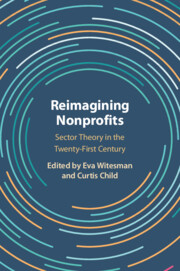Book contents
- Reimagining Nonprofits
- Reimagining Nonprofits
- Copyright page
- Contents
- Figures
- Tables
- Contributors
- Acknowledgments
- 1 An Invitation to Rethink the Nonprofit Sector
- Part I Overviews
- Part II Reflections and Refinements
- 5 Sector Theorists Should Consider How Social Values Determine Unmet Needs
- 6 Sector Theorists Should Embrace a Social Economy Perspective
- 7 Sector Theorists Should Expand Three-Failures Theory to Include the Family Sector and Varied Forms of Government
- 8 Sector Theorists Should Be Wary of the Nonprofit Industrial Complex
- 9 Sector Theorists Should Be Inclusive of Muslim and Non-Western Perspectives
- 10 Sector Theorists Should Revisit the Role of Information
- 11 Sector Theorists Should Borrow Epistemologies
- Part III New Directions
- Part IV Conclusion
- Index
- References
7 - Sector Theorists Should Expand Three-Failures Theory to Include the Family Sector and Varied Forms of Government
from Part II - Reflections and Refinements
Published online by Cambridge University Press: 11 January 2024
- Reimagining Nonprofits
- Reimagining Nonprofits
- Copyright page
- Contents
- Figures
- Tables
- Contributors
- Acknowledgments
- 1 An Invitation to Rethink the Nonprofit Sector
- Part I Overviews
- Part II Reflections and Refinements
- 5 Sector Theorists Should Consider How Social Values Determine Unmet Needs
- 6 Sector Theorists Should Embrace a Social Economy Perspective
- 7 Sector Theorists Should Expand Three-Failures Theory to Include the Family Sector and Varied Forms of Government
- 8 Sector Theorists Should Be Wary of the Nonprofit Industrial Complex
- 9 Sector Theorists Should Be Inclusive of Muslim and Non-Western Perspectives
- 10 Sector Theorists Should Revisit the Role of Information
- 11 Sector Theorists Should Borrow Epistemologies
- Part III New Directions
- Part IV Conclusion
- Index
- References
Summary
The authors of this chapter conceptualize the “three-failures” perspective in nonprofit-sector theorizing. They then propose the sectoral advantage framework, which revises and generalizes the three-failures approach. The revised framework offers a set of questions and a way of thinking about and interpreting diverse puzzles in the field. The framework uses consistent definitions and criteria so that it can be applied to a broad range of institutions, cultures, and historical periods. The authors develop three themes within the framework: First, they add the family sector and consider its comparative advantages, failures, and activities. Second, they generalize government failure to make it more comprehensive and applicable outside Western democracies. Third, they suggest the capability approach should be incorporated in the determination of sectoral advantages.
Keywords
Information
- Type
- Chapter
- Information
- Reimagining NonprofitsSector Theory in the Twenty-First Century, pp. 133 - 153Publisher: Cambridge University PressPrint publication year: 2024
